Apple Maps: The Road to Discovery (Part 2)
Apple is just getting started with its push into local business discovery and monetization for Apple Maps. AR is also in its future.

Apple's development of new Map discovery and transaction features, detailed in Part 1, point to an Apple [1] that will increasingly integrate augmented reality and other features into Maps.
While still catering to the consumer, these new capabilities will provide additional local business marketing opportunities and SMB-related income for Apple.
Why These Catch-up Features Matter
As I noted in Part 1, Apple spent nine years building out Maps, following Google’s feature playbook. Yet Apple still hasn't quite caught up. So why does it really matter?
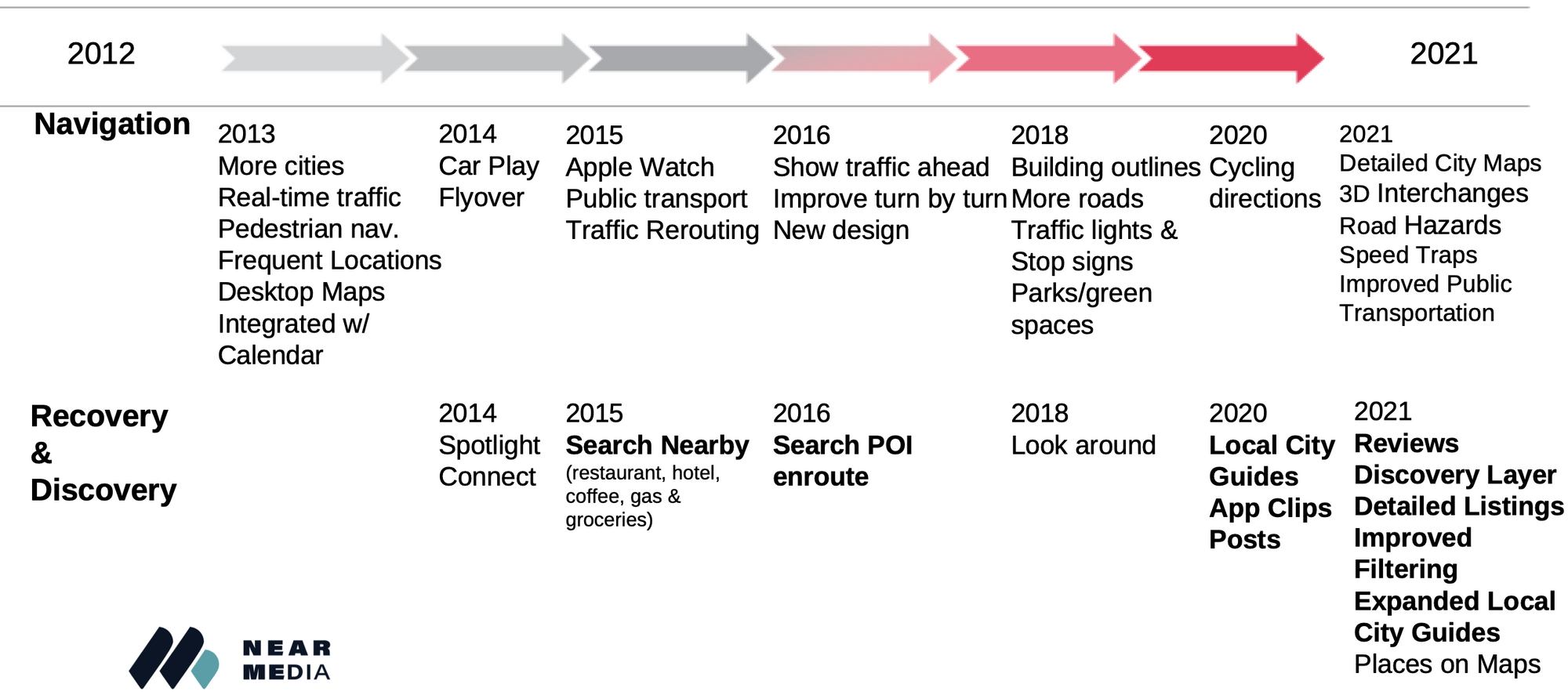
Apple is arguably the only company that can, in the short term, provide an alternative SMB marketing environment, which might perform as well or better than Facebook or Yelp, thus giving SMBs a choice. But it could very well be that Apple isn’t building toward that short term future but the next bigger one, AR.
When Apple started mapping the world in 2012 they faced intense criticism for releasing a poorly performing product. Nine years later they have demonstrated that they can deliver not just a functional navigational tool but one that can help consumers more readily find local businesses. That has a number of implications.
Apple Local Is More than Maps
Horace Dediu estimated that there are 1 billion Apple Maps users. Andrew Shotland of LocalSEOGuide estimated earlier this year that there are roughly 75 million Map users in the U.S [2].
I would argue that the available population that can and does access local information via an iPhone is almost as large as the installed base of iPhone users, which amount to 2 billion worldwide. Roughly 150 million of those users are in the U.S. When you count the many different Macs, Watches, CarPlay devices and iPads that each iPhone user owns, the number of surfaces that local information is shown on grows even larger.
Everyone is always asking when Apple will release a search engine. It already has. It just doesn't look or act like Google or Bing. It's like, well ... it's like Apple [3]. Apple search is deeply tied into the iPhone experience, and local search works across the full range of interfaces: Maps, Spotlight, Safari and Siri.
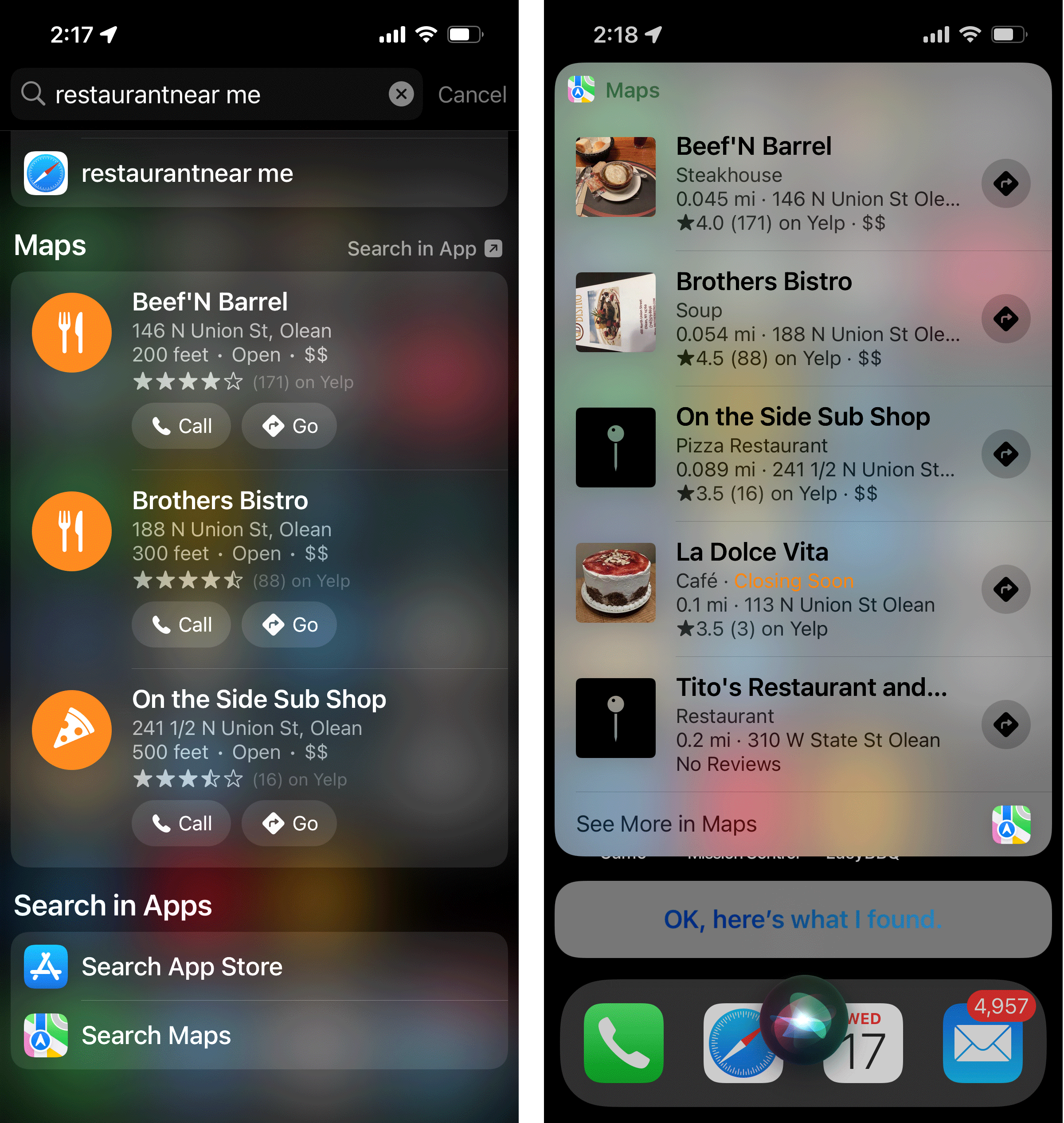
It doesn't exist just on the iPhone [4] but on the iPad, CarPlay, the Apple Watch and the Mac as well. The search can be initiated on any device.
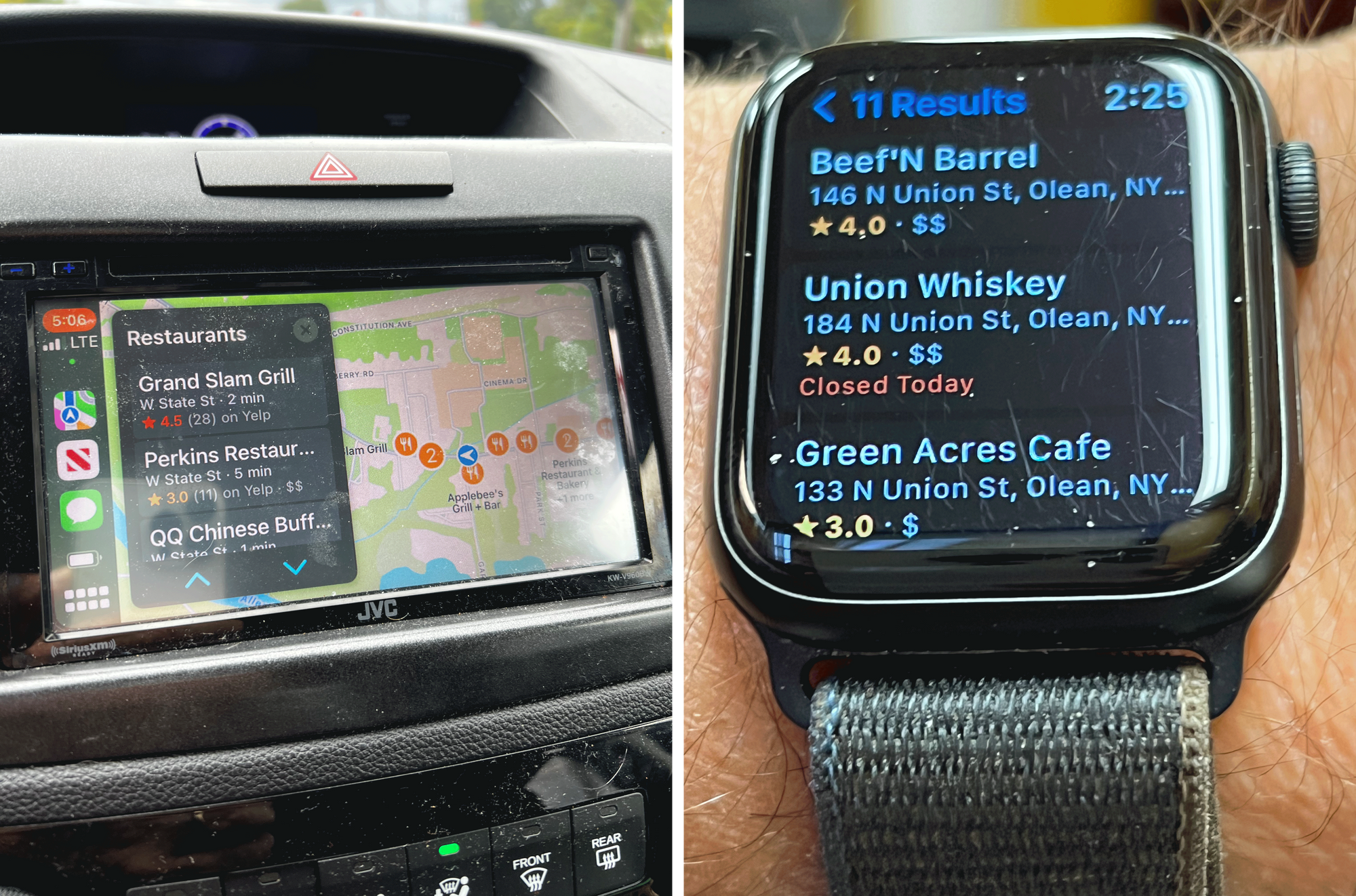
Interacting with Apple's local information is an integrated experience that works by voice or text across any surface that the user is currently engaging with [5]. The results move transparently between devices as well. For example, I might start a search using Spotlight on my iPhone, select driving directions and then get into the car. The Map results automatically start up in CarPlay with turn-by-turn also displaying on my wrist via the Watch. Haptic feedback is then provided via the Watch as turns approach. Using navigation while wearing an Apple Watch is almost like wearing the internet and it hints at the augmented future.
Will Businesses Start to Notice?
One of the big stumbling blocks keeping SMBs and their agencies from focusing on Apple Maps is the total lack of the ability to "see" traffic coming from Apple Maps or other Apple local interfaces. Typically this traffic shows up as "direct" web traffic in Google Analytics.
For most local businesses this direct Apple traffic, that did not come via Google Local or Google search, is around 5% of their overall traffic, often equal to or more than came from Facebook or Yelp. However in hospitality businesses we see as many as 20% of their users coming to the website via iPhone direct traffic. While not all of that is discovery traffic, it constitutes a large percentage of the total user visits and one can infer that some significant portion of the web traffic is discovery traffic.
As with Google Local, additional users are stopping at the Place Card and taking an action directly on the Place Card so the direct traffic to the website is but a percentage of the total coming from iPhone. Unfortunately, this isn't measured yet.

The good news for marketers is that the impact of Apple traffic may soon become more visible. I have heard from multiple sources that Apple will be providing local insights data in early 2022.
With Apple's many improvements to Maps and their local search functionality, there is a strong case that businesses need to have their listing on the many surfaces where Apple Maps data can be accessed.
A hundred million devices here, a hundred million devices there, together with some reporting, and Apple might soon have enough impact on small business marketing that folks begin to notice.
The Case for SMB Monetization by Apple
Apple has had a great run over the past 15 years, reaching stratospheric valuations based on consistently strong profits from hardware sales and an increasing services-subscription base. They have done this by entering new hardware markets successfully and then incrementally adding services and functions across their platforms to achieve a high degree of customer loyalty (and lock in).
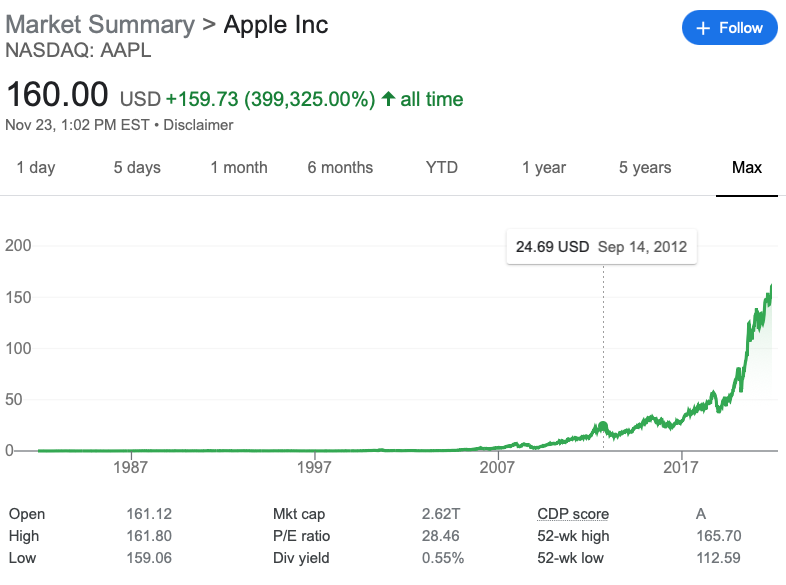
Investor demand for increased growth and profits will continue. I believe that in the short term the local business market is one of the largest untapped opportunities available to Apple.
In the U.S. alone there are over 30 million businesses and we saw that Apple recently introduced a small business package, Apple Business Essentials that "brings device management, support, and storage into one complete subscription for small businesses." This is directly competitive with both Google Workspace and DropBox but with a unique hardware support and repair angle. Clearly Apple is going after this market.
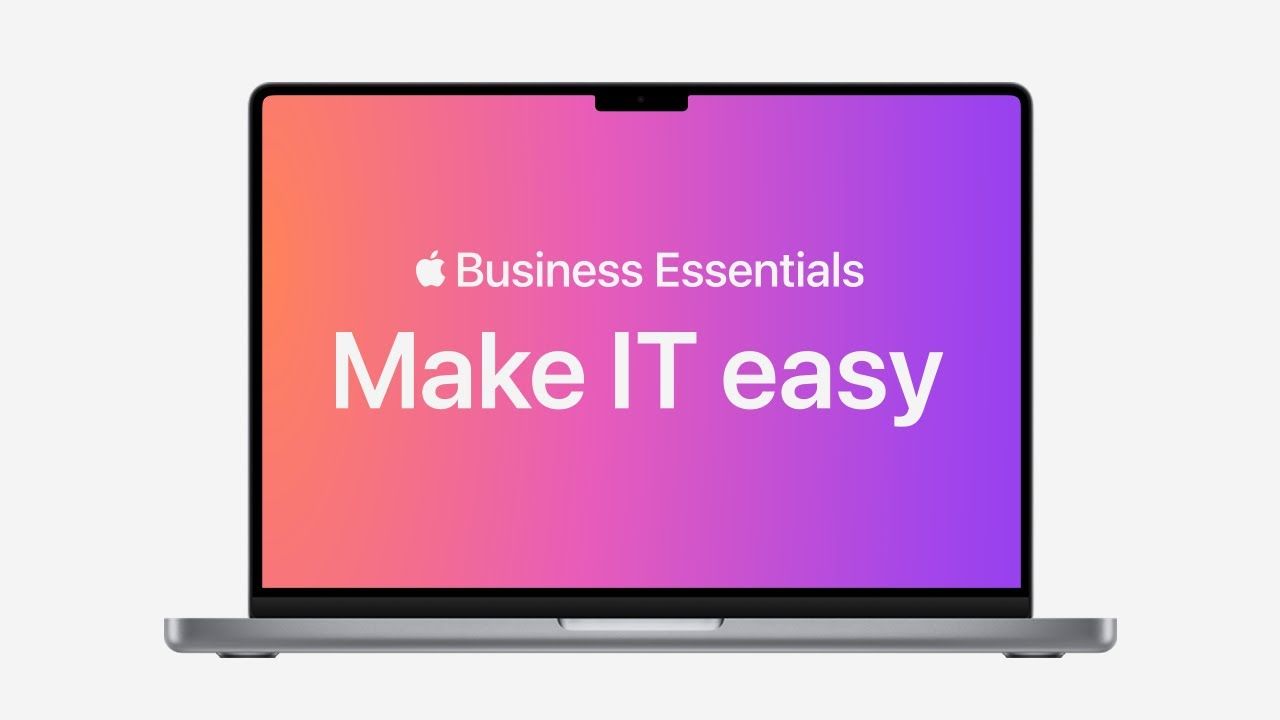
Some think that the next obvious play from an SMB income point of view would be advertising. Despite the common perception, Apple is not opposed to advertising – just advertising that "sucks." Apple believes that they can do it better and take that profit for themselves[6].
Apple also believes that they can do Maps better.
That belief is expressed in the recent roll-out of their own reviews in April of this year. By providing a way to limit spam and minimize conflict, they have become well-positioned against the snark of Yelp and the spam of Google. While good for consumers, it is also good for business and much less likely to create the animosity that Yelp, and now Google, have engendered.
Apple Guides offer a similarly different approach to discovery. Curated and trusted third-party information is directly integrated into the search experience on Maps. This allows the user to gain both additional knowledge that can be trusted and make more informed decisions, all within Apple Maps. This contrasts with Google's algorithmically derived and somewhat superficial local results and business profiles.
By improving Maps discovery, so that an increasing number of consumers use Apple Maps to find new businesses, and by providing analytics to help business understand the traffic and engagement coming from Apple Maps and local search on the iPhone, Apple Maps ads are a possible near-term play. What isn't clear is whether potential revenue from that play would be enough to warrant Apple's attention.
Maps and the Augmented Future
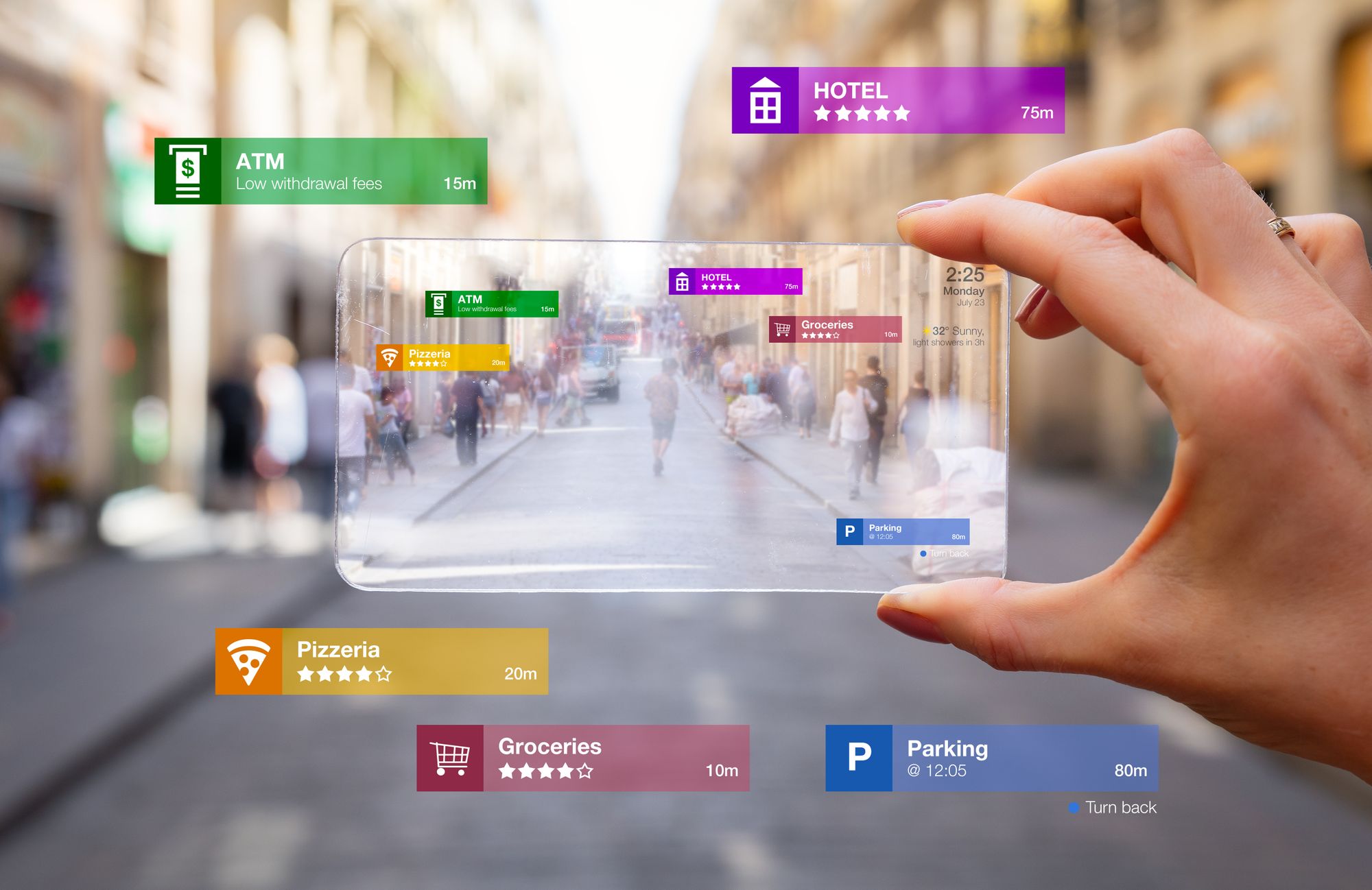
While Apple has been spending the last nine years catching up to Google Maps they have also been building out a series of products and foundational technology that prepares them for the next big hit.
Apple never just works for the near term. Their patience is great and their vision is long. They see augmented reality as a contributor to a likely future and they seem to be clearly working in that direction. We have seen a number of comments from Tim Cook, a steady stream of AR patents and almost daily rumors to that effect.
These products and technologies, along with Maps, puts them in an enviable position to define a reality quite different than the dystopian Metaverse offered up by Mark Zuckerberg. [7]
Apple has spent the last nine years building out hardware and software across the home, the car, audio, mobile and the desktop. That gives the company a huge advantage over the likes of Facebook, which has no platform, and even Google, which has several platforms but not the integration. Here are just a few of those developments that give Apple a leg up:
- Market leading position in wearables with budding AR features
- Platform wide AR toolkit that works on every current device
- Fast, low power draw and extremely powerful microprocessors & GPUs that Apple controls completely
- Integrated hardware that can leverage each device's strength
- Integrated software to facilitate cross device development of the tools and products that will push AR forward
These developments have led to foundational and mature technologies that already exist and just need stitching [8] together to create an immersive AR-ready world:
- AirPod spatial audio for music, movies and video conferencing allowing users to understand where sound is coming from
- Watch hand gestures allowing computer control necessary in an augmented reality
- Low power computing critical for using power hungry AR in the real world
Some think that with Apple's many starting points and so many pieces already in play, AR is Apple's game to lose. It's into this ecosystem that Maps, a near final piece of the puzzle, fits.
I don't know what the future of augmented reality looks like but I do know that Maps is one surface where it makes sense. It makes sense as a front facing part of the consumer experience as well as a foundational technology for their platform and platform partners.
You can see hints of integrating the real and virtual world in Maps with their flyovers and incredibly smooth look around technology. And you can see it more explicitly in their AR walking directions (similar to Google Live View). You can also feel whispers of it when your Apple Watch taps your wrist for the next turn you need to make.
The Metaverse is likely to offer numerous financial opportunities. The big and not so big players are already fighting over the possible riches. You can see manifestations of this in early megalomaniacal planning, current lawsuits and very public positioning.[9]
If we look at what is already present in the Apple arsenal, together with Apple's long term vision, success at releasing hit products, hardware/software integrations, and their need for income it seems inevitable that Apple will be a major player in AR – and Maps will have a role to play.
Although in typical Apple style, it is likely to not be a pure AR play but rather a hardware product with significant consumer value that so tightly integrates AR that it becomes the obvious solution to a problem that we didn't know that we had. [10]
Apple is just getting started with their push into the world of business discovery and its monetization for Apple Maps.
[1] Disclosure: I own Apple stock. That being said, having once been personally burned by them arbitrarily taking away a million dollars a year in computer sales from one month to the next, I have no delusions about their willingness to do just about anything to maximize profits.
[2] For many years the only users of Apple Maps were those that didn't know any better and just used the default Map. Some even thought that it was in fact Google Maps. However, in speaking with a number of my friends in the local industry, I have seen anecdotal evidence that more savvy users have made the switch back to Apple Maps; some for privacy reasons and some for the user experience.
[3] This will become more obvious when Apple, either willingly or by the force of government, gives up their multi-billion dollar arrangement with Google to put Google's search engine front and center. But hey, $15 Billion pays for the annual costs of Map development(about $1-$2 billion per Asymco) and leaves a little bit over for kitty as well.
[4] Apple is also "intercepting" many searches made via the Safari URL field search and sending them directly to a website. With branded local searches, these searches are sent directly to Maps. It will be interesting to see if the proposed anit-trust self-preferencing laws will impact this tactic.
[5] As an aside/footnote, I am probably one of Apple's heaviest users of Siri as I use it at home, in my car, in my office, on my watch and on the go. I interact with Siri on an hourly basis to make calls, set reminders, check the weather and stocks, do internet queries, send texts to friends and family and more. For some devices, like the Watch and CarPlay, voice is the obvious and most useful interface.
Unlike other voice input competitors, Siri is with you everywhere not just in the home or just in the car or just on your phone. And while it is the current whipping boy of the talking heads it is the leading voice assistant in most categories and particularly in the one that provides the most queries, mobile phones.
[6] Whether by hook or by crook. Apple's recent iPhone privacy efforts have been very successful in getting users to opt out of 3rd party tracking. This has had the added (perhaps intended) consequence of increasing the value of Apple's advertising.
[7] Although who is to say that Apple's version of augmented and virtual reality won't be as dystopian as that of Facebook's?
[8] Ok, VR pun intended.
[9] Some might call it mansplaining or even dick waving.
[10] This could be anything from a self driving car to some sort of health or exercise product. After struggling with recent eye surgery and glasses, I could even imagine a pair of auto-adjusting glasses that don't just make the world clearer but more informative. Regardless Apple's use of AR is likely to be embedded in some way to augment humanity not reality per se.
